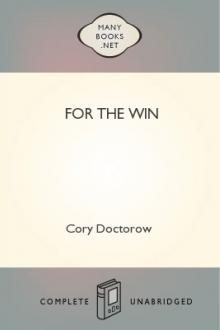For the Win - Cory Doctorow (read novels website txt) 📗

- Author: Cory Doctorow
- Performer: -
Book online «For the Win - Cory Doctorow (read novels website txt) 📗». Author Cory Doctorow
Yes, it would work. Connor was sure of it. He started to calculate the true value of various elite items, casting about for undervalued items. What he discovered surprised him: while virtual currency tended to rest pretty close to its real value, plus or minus five percent, the value-gap in elite items was gigantic. Some items routinely traded for two or three hundred percent of their real value -- as predicted by his Equations, anyway -- and some traded at a pittance.
Never for a moment did he doubt his equations, though a more humble or more cautious person might have. No, Connor looked at this paradoxical picture and the first thing that came into his head wasn't "Oops." It was BUY!
And he bought. Anything that was undervalued, he bought, in great storehouses, so much that he had to create alts and secondaries in many worlds, because his primary characters couldn't carry all the undervalued junk he was buying. He spent a hundred dollars -- two hundred -- three hundred, snapping up assets, spreadsheeting their nominal value. On paper, he was incredibly, unspeakably rich. On paper, he could afford to move out of his one-bedroom apartment that was a little too close to the poor and scary East Palo Alto for his suburban tastes, buy a McMansion somewhere on the peninsula, and go into business full time, spending his days buying magic armor and zeppelins and flaming hamburgers, and his evening opening checks.
In reality, he was going broke. The theory said that these assets were wildly undervalued. The marketplace said otherwise. He'd cornered the market on several kinds of marvellous gew-gaws, but no one seemed to actually want to buy them from him. He remembered Jenny Rosen, and all the crushing ways that theory and reality could sometimes stop communicating with one another.
When the first red bills came in, he stuck them under his keyboard and kept buying. He didn't need to pay his cell phone bill. He didn't need his cell-phone to buy magic lizards. His student loans? He wasn't a student anymore, so he didn't see why he should worry about them -- they couldn't kick him out of school. Car payments? Let them repo it (and they did, one night, at 2AM, and he waved goodbye to the little hunk of junk as the repo man drove it away, then turned back to his keyboard). Credit card bills? So long as there was one card that was still good, one card he could use to pay the subscription fees for his games, that was all that mattered.
Living close to East Palo Alto had its advantages: for one thing, there were food-banks there, places where he could line up with other poor people to get giant bricks of government cheese, bags of day-old bread, boxes of irregular and unlovely root-vegetables. He fried all the latter in an all-day starch festival and froze them, and then he proceeded to live off of cheese and potato sandwiches, and one morning, he realized that his entire body and everything that came out of it -- breath, burps, farts, even his urine -- smelled of cheese sandwiches. He didn't care. There were ostrich plumes to buy.
Disaster struck: he lost track of which credit card he was ignoring and had half of his accounts suspended when his monthly subscription fees bounced. Half his wealth, wiped out. And the other card wasn't far behind.
He thought he could probably call his parents and grovel a bit and get a bus ticket to Petaluma, hole up in his folks' basement and lick his wounds and be yet another small-town failure who came home with his tail between his legs. He'd need a roll of quarters and a payphone, of course, because his cellphone was now an inert, unpaid, debt-haunted brick. Lucky for him, East Palo Alto was the kind of place where you got lots of people who were too poor even to go into debt with a cell-phone, people who also needed to use payphones.
He tucked himself into his grimy bed on a Wednesday morning and thought, Tomorrow, tomorrow I will call them.
But tomorrow he didn't. And Friday he didn't, though he was now out of government cheese and wasn't eligible for more until Monday. He could eat potato sandwiches. He couldn't buy assets anymore, but he was still tracking them, watching them trade and identifying the bargains he would buy, if only he had a little more liquidity, a little more cashish.
Saturday, he brushed his teeth, because he remembered to do that sometimes, and his gums bled and there were sores on the insides of his mouth and now he was ready to call his parents, but it was 11PM somehow, how did the day shoot past, and they went to bed at 9 every night. He'd call them on Sunday.
And on Sunday -- on Sunday -- on that magical, wonderful Sunday, on Sunday --
THE MARKET MOVED!
There he was, pricing assets, recording their values in his spreadsheet, and he realized that the asset he was booking -- a steampunk leather gasmask adorned with a cluster of huge leathery ear-trumpets and brass cogs and rivets (no better than a standard gasmask in the blighted ecotastrophe world that was Rising Seas, but infinitely cooler) -- had already been entered onto his sheet, weeks before. Indeed, he'd booked the mask when its real world cash value was about $0.18, against the $4.54 the Equations predicted. And now he was booking it at $1.24, which meant that the 750 of them he had in inventory had just jumped from $135 to $930, a profit of $795.
There was a strange sound. He realized after a moment that it was his stomach, growling for food. He could flip his gasmasks now, take the $795 onto one of his PayPal debit cards, and eat like a king. He might even be able to buy back some of his lost accounts and recover his assets.
But Connor did not consider doing this, even for a second. He dashed to the sink and filled up three cooking pots with water and brought them back to his desk, along with a cup. He filled the cup and drank it, filled it and drank it, filling his stomach with water until it stopped demanding to be filled. This was California, after all, where people paid good money to go to "retreats" for "liquid fasting" and "detox." So he could wait out food for a day or two... After all, his Equations predicted that these things should go to $3,405. He was just getting started.
And now the gasmasks were rising. He'd get up, go to the bathroom -- his kidneys were certainly getting a workout! -- and return to check the listings on the official exchange sites and the black-market ones where the gold-farmers hung out. He had a little formula for calculating the real price, using these two prices as a kind of beacon. No matter how he calculated it, his gasmasks were rising.
And yes, some of his other assets were rising, too. A robot dog, up from $1.32 to $1.54, still pretty far off from the $8.17 he'd predicted, but he owned a thousand of the things, which meant that he'd just made $1,318.46 here, and he was just getting started.
Up and up the prices went, as asset after asset attained liftoff, and he began to suspect that his asset-buying spree had coincided with an inter-world depression across all virtual economies, which accounted for the huge quantities of undervalued assets he'd found lying around. There was probably an interesting cause for all those virtual economies slumping at once, but that was something to study another day. As it was, he was more interested in the fact that the economies were bouncing back while he was sitting on mountains of dirt-cheap imaginary gewgaws, knickknacks, tchotchkes and white-elephants, and that their values were taking off like crazy.
And now it was time to convert some of those assets to money and some of that money to food, rent, and paid-off bills. His collection of articulated tentacles from Nemo's Adventures on the Ocean Floor were maturing nicely -- he'd bought them at $0.22, priced them at $3.21, and now they were trading at $3.27 -- so he dumped them, and regretted that he'd only bought 400 of them. Still, he managed to dump them for a handy $1150 profit (by the time he'd sold 300 of them, the price had started to tip down again, as the supply of tentacles increased and the demand diminished).
The money dribbled into his PayPal account and he used that to order three pizzas, a gallon of orange juice and ten boxes of salad, paid off his suspended accounts, and sent $400 to his landlord against the $3500 he owed for two months' rent, along with a begging letter promising to pay the rest off within a day or two.
While he waited for the pizzas to arrive, he decided he'd better shower and shave and try to do something about his hair, which had started to go into dreadlocks from a month without seeing a hairbrush. In the end, he just cut the tangles out, and got dressed in something other than his filthy housecoat for the first time in a week -- marvelling at how his jeans hungoff his prominent hips, how his t-shirt clung to his wasted chest, his ribs like a xylophone through the pale skin. He opened all the windows, aware of the funk of body-odor and stale computer-filtered air in his apartment, and realized as he did that it was morning, and thanked his lucky stars that he lived in a college town, where you could get a pizza delivered at 8:30AM.
He barfed after eating the first pizza, getting most of it into the big pot he'd used to hold his drinking water, big chunks of crust and pepperoni, reeking of sour stomach-acid. He didn't let that put him off. His PayPal account was now bulging, up to $50,000, and he was just getting started. He switched to salads and juice, figuring it would take a little while to get used to food again, and not having the time just now to take a long bio-break. His body would have to wait. He ordered an urn of coffee from a place that catered corporate meetings, the kind of thing that held 80 cups' worth, and threw in a plate of sliced veggie and some pastries.
Selling was getting easier now. The economies were bouncing back, and from the tone of the thank-you messages he got from his buyers, he understood that there was a kind of reverse-panic in the air, a sense that players all over the world were starting to worry that if they didn't buy this junk now, they'd never be able to buy it, because the prices would go up and up and up forever.
And it was then that he had his second great flash, the second time that the finger of God reached down and touched his mind, with a force that shook him out of his chair and set him to pacing his living room like a tiger, muttering to himself.
Once, when he'd been working on his Masters, he'd participated in a study for a pal in the economics department. They'd locked twenty five grad students into a room and given each of them a poker chip. "You can do whatever you want with those chips," the experimenter had





Comments (0)